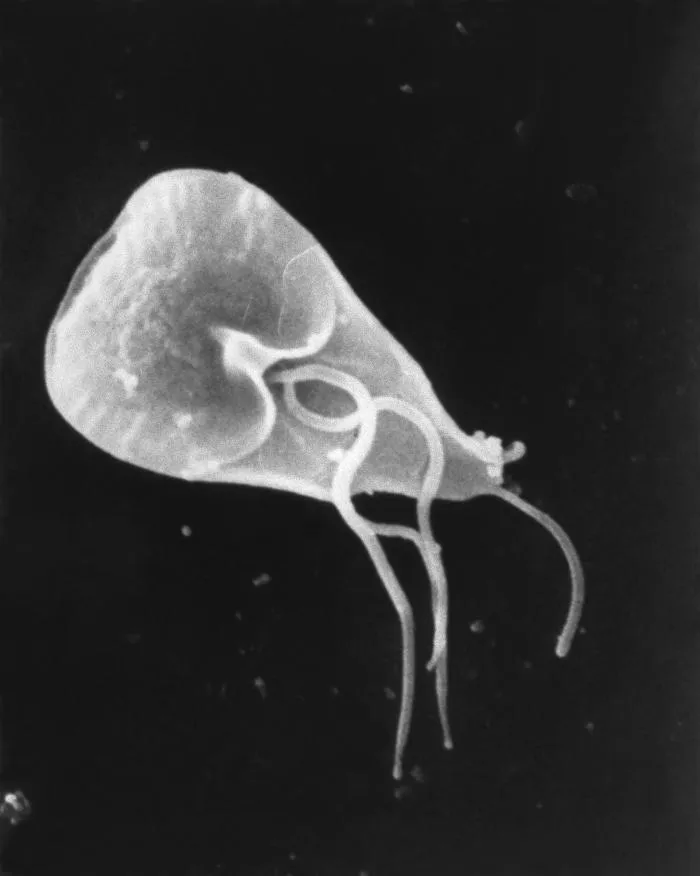Giardia in cats and dogs
Giardia is one of the most common intestinal parasites in dogs and cats. Although an infection hardly causes any symptoms in many animals, the parasite can cause persistent, recurrent diarrhea in some animals. The parasite can remain in the patient's environment for a long time. It is therefore common for a dog or cat to re-infect itself.

An animal is infected by eating the parasite
Outside, in areas frequented by dogs and cats, Giardia is almost always present. Wild animals can also carry the parasite and contribute to the contamination of the environment.
The dog or cat becomes infected by eating the parasite. For example by eating or drinking outside, or by licking the paws after walking. If your pet does not go outside, it is possible that you bring the parasite yourself through, for example, your shoes and that your pet becomes infected in this way.
An infected animal spreads the parasite
If your pet has swallowed the parasite, the parasite multiplies in the intestines. This can cause problems, but it doesn't have to be. Infected animals, healthy and unhealthy, can carry the parasite and contaminate the environment.
Symptoms Giardia in dogs and cats
Most animals with Giardia have no problems.
When animals get diarrhea, it can go away on its own, be intermittent (it comes and goes) or become chronic (long-term and continuous). The stools are often paler, smelly and greasy. Animals defecate more often, strain on the stool and the stool may be slimy or contain fresh blood.
Detect the parasite
Giardia can be detected in the stool. Various tests are possible: the most commonly used tests are the SNAP test and the flotation test.
No test is 100% sensitive, which means that a test sometimes turns out negative, even though your animal is carrying Giardia. Because the parasite is excreted one day and not the next, it is important to collect stool from 3 consecutive days.
Treatment of Giardia in the environment
Giardia cysts (the parasite with a shell around it) can survive outside the animal for a long time. The colder and more humid the environment, the longer the parasite remains infectious.
- For example, in water colder than 10°C, this parasite can survive for up to 3 months.
- In a dry environment with direct sunlight, the cyst is "only" infectious for a few days.
A dry, bright room, where the patient has not been for at least a week, can be considered clean. To clean an environment faster, hot water / steam, chlorine, quaternary ammonium salts or UV light can be used:
Steam
Hot water can kill Giardia. The water must then remain hot long enough (at least 1 minute warmer than 70 degrees Celsius).
- A stainless steel kennel probably cools down too quickly to steam clean.
- Rugs, upholstery, clothes, baskets, etc. can be washed at 60 degrees Celsius. The tumble dryer can also contribute to the disinfection of garments. If the tumble dryer is not an option, we recommend that you let fabric materials dry in direct sunlight after washing.
Chlorine and Quaternary Ammonium Salts
This is found in fabric softener and certain disinfectant cleaners. These substances can kill Giardia cysts.
The substances only work in a clean environment. A room must therefore be cleaned with soap and water, rinsed well and dried before disinfecting with Chlorine or Quaternary Ammonium Salts.
These substances need time to do their job. If the instructions for use do not indicate a time, allow at least 5 minutes for the reaction time.
UV light
UV light kills the parasite. However, this light does not come in a shaded spot. In practice, this is therefore not suitable for disinfecting a kennel or cattery.
Quarantine
Some animals are Giardia free after treatment (including washing and disinfecting the environment). Other animals need to be treated several times. If you have several animals, it is sometimes wise to temporarily house the animals individually.
Giardia in humans
Some Giardia strains can infect dogs, cats and humans. So pay attention to your own hygiene, if you come into contact with a Giardia patient
- Wear gloves
- Wear protective clothing
- Cut your nails short
- Wash your hands thoroughly
Vaccination Giardia
Vaccines have been developed against Giardia. Unfortunately these are not effective.